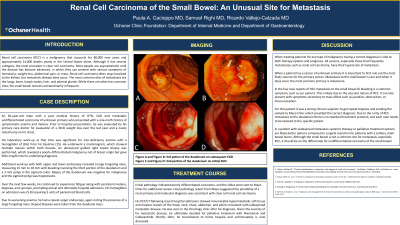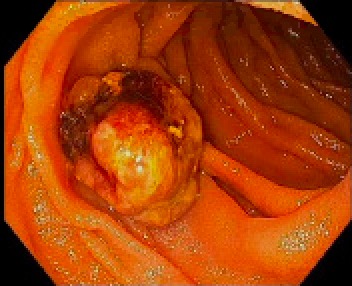Back


Poster Session E - Tuesday Afternoon
Category: Small Intestine
E0670 - Renal Cell Carcinoma of the Small Bowel: An Unusual Site for Metastasis
Tuesday, October 25, 2022
3:00 PM – 5:00 PM ET
Location: Crown Ballroom

Has Audio

Paula A. Cacioppo, MD
Ochsner Clinic Foundation
Metairie , LA
Presenting Author(s)
Paula A. Cacioppo, MD1, Samuel Righi, MD2, Ricardo Vallejo-Calzada, MD2
1Ochsner Clinic Foundation, Kenner, LA; 2Ochsner Clinic Foundation, New Orleans, LA
Introduction: Renal cell carcinoma (RCC) is a malignancy that accounts for 80,000 new cases and approximately 14,000 deaths yearly in the United States alone. Although it has several subtypes, the most prevalent is clear cell carcinoma. Most people are asymptomatic until the disease has advanced, in which they can present with various symptoms of hematuria, weight loss and abdominal pain. RCC often stays localized to the kidney, but metastatic disease does occur. The most common sites of metastases are the lungs, bone, lymph nodes, liver, and adrenal glands. While there are other less common sites, the small bowel remains extraordinarily infrequent.
Case Description/Methods:
An 81-year-old male with a medical history of metastatic undifferentiated carcinoma of unknown primary presented with a one-month history of symptomatic anemia and melena. He reported a 40-lb weight loss over the last year and a newly noted lump on his chest. Laboratory work-up was significant for anemia with a hemoglobin of (8.6) from his baseline (15). He underwent a mammogram, which showed multiple masses within both breasts. An ultrasound guided right breast biopsy was performed, which revealed a poorly differentiated malignancy not of breast origin. Additional work-up with both upper and lower endoscopy revealed a large fungating mass, measuring 15 to 18 mm with bleeding involving the third portion of the duodenum. Biopsy was negative for malignancy at that time. Over the next few weeks, he continued to experience fatigue and melena, requiring hospital admission. Due to worsening anemia, he had a repeat upper endoscopy, again noting the presence of a large fungating mass. Repeat biopsies from the mass indicated poorly differentiated carcinoma, and the slides were sent to Mayo Clinic for additional review. Final pathology report suggested the possibility of a renal primary and molecular diagnosis was consistent with clear cell renal cell carcinoma.
Discussion: Metastasis to the small bowel is rare and when it does occur the most common primary is melanoma. In the few case reports of RCC metastasis to the small bowel GI bleeding is a common symptom. Due to the rarity of RCC metastasis to the duodenum there is no standard treatment protocol. In a patient with widespread metastasis systemic therapy or palliative treatment options are better options compared to surgical resection. Although the small bowel is not a common site for metastasis, especially RCC, it should be considered for undifferentiated carcinoma of the small bowel.

Disclosures:
Paula A. Cacioppo, MD1, Samuel Righi, MD2, Ricardo Vallejo-Calzada, MD2. E0670 - Renal Cell Carcinoma of the Small Bowel: An Unusual Site for Metastasis, ACG 2022 Annual Scientific Meeting Abstracts. Charlotte, NC: American College of Gastroenterology.
1Ochsner Clinic Foundation, Kenner, LA; 2Ochsner Clinic Foundation, New Orleans, LA
Introduction: Renal cell carcinoma (RCC) is a malignancy that accounts for 80,000 new cases and approximately 14,000 deaths yearly in the United States alone. Although it has several subtypes, the most prevalent is clear cell carcinoma. Most people are asymptomatic until the disease has advanced, in which they can present with various symptoms of hematuria, weight loss and abdominal pain. RCC often stays localized to the kidney, but metastatic disease does occur. The most common sites of metastases are the lungs, bone, lymph nodes, liver, and adrenal glands. While there are other less common sites, the small bowel remains extraordinarily infrequent.
Case Description/Methods:
An 81-year-old male with a medical history of metastatic undifferentiated carcinoma of unknown primary presented with a one-month history of symptomatic anemia and melena. He reported a 40-lb weight loss over the last year and a newly noted lump on his chest. Laboratory work-up was significant for anemia with a hemoglobin of (8.6) from his baseline (15). He underwent a mammogram, which showed multiple masses within both breasts. An ultrasound guided right breast biopsy was performed, which revealed a poorly differentiated malignancy not of breast origin. Additional work-up with both upper and lower endoscopy revealed a large fungating mass, measuring 15 to 18 mm with bleeding involving the third portion of the duodenum. Biopsy was negative for malignancy at that time. Over the next few weeks, he continued to experience fatigue and melena, requiring hospital admission. Due to worsening anemia, he had a repeat upper endoscopy, again noting the presence of a large fungating mass. Repeat biopsies from the mass indicated poorly differentiated carcinoma, and the slides were sent to Mayo Clinic for additional review. Final pathology report suggested the possibility of a renal primary and molecular diagnosis was consistent with clear cell renal cell carcinoma.
Discussion: Metastasis to the small bowel is rare and when it does occur the most common primary is melanoma. In the few case reports of RCC metastasis to the small bowel GI bleeding is a common symptom. Due to the rarity of RCC metastasis to the duodenum there is no standard treatment protocol. In a patient with widespread metastasis systemic therapy or palliative treatment options are better options compared to surgical resection. Although the small bowel is not a common site for metastasis, especially RCC, it should be considered for undifferentiated carcinoma of the small bowel.

Figure: 3rd portion of the duodenum
Disclosures:
Paula Cacioppo indicated no relevant financial relationships.
Samuel Righi indicated no relevant financial relationships.
Ricardo Vallejo-Calzada indicated no relevant financial relationships.
Paula A. Cacioppo, MD1, Samuel Righi, MD2, Ricardo Vallejo-Calzada, MD2. E0670 - Renal Cell Carcinoma of the Small Bowel: An Unusual Site for Metastasis, ACG 2022 Annual Scientific Meeting Abstracts. Charlotte, NC: American College of Gastroenterology.
